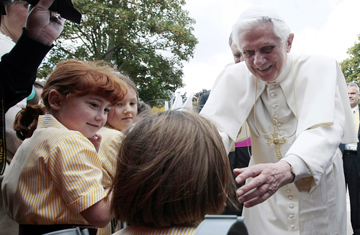
Pope Benedict XVI greets children at St. Mary University College in Twickenham, England, on Sept. 17, 2010
As protest chants go, "What do we want? A secular Europe! When do we want it? Now!" isn't exactly catchy. But it was a message Pope Benedict XVI heard loud and clear during his historic four-day state visit to Britain, the first ever by a Pope. And it was one he had determined to meet head-on by getting his retaliation in first, even before he touched down in Glasgow at the start of the trip.
With the child-sex-abuse scandal and the Vatican's stance on contraception, abortion, and gay and women's rights fueling much of the protests — which culminated in a 10,000-strong Protest the Pope march in London on Saturday — Benedict chose his visit to the U.K. as the moment to express "deep sorrow and shame" over the scandal, confessing it "undermined the moral credibility" of the church and insisting cases should be treated as crimes rather than, as has previously been suggested, a matter for the church to handle. As has become his habit, he also held a private, face-to-face meeting with five victims ages 40 to 50, during which he pledged to ensure that abusers were "brought to justice," said a spokesman.
But Benedict arrived in the U.K. armed with a wider message, making repeated warnings against what he claimed was a growth in "aggressive forms of secularism" in British society. It was that same phenomenon, he suggested, that led to the birth of the Nazis in his native Germany.
The theme had been set out, albeit in a less nuanced fashion, three days before the Pope arrived in Britain, when an article in the German magazine Focus quoted Benedict's close aide Cardinal Walter Kasper likening Britain to a third-world country, with the declaration, "Above all, an aggressive New Atheism is widespread in England. If you, for example, wear a cross at British Airways, you'll be disadvantaged."
Kasper's remarks sparked an outcry in the U.K., and it was later announced that he would not be traveling with the Pope as planned. The last-minute cancellation was said to be due to a nasty case of gout.
But the Pope returned to the theme on a number of occasions during his visit. Alongside the Queen at Holyrood House (her residence in Edinburgh) during his official welcome on Sept. 16, Benedict spoke of the "atheist extremism" of the 20th century, saying, "Even in our own lifetimes, we can recall how Britain and her leaders stood against a Nazi tyranny that wished to eradicate God from society."
It's a view that did little to placate the demonstrators as they gathered at London's Hyde Park two days later — where they were outnumbered roughly 10 to 1 by those faithful "pilgrims" who had come to join a prayer vigil with the Pope. "That's rich, coming from the leader of a faith that has supported repressive regimes, condemned millions to suffering through its attitude to contraception and equality, and covered up child abuse by its own ministers," said one marcher.
The Pope's comments also prompted a response from Prime Minister David Cameron. "Faith is part of the fabric of our country," he said in a speech in the northern city of Birmingham on Sept. 19, Benedict's last day in Britain. "It always has been, and it always will be."
Over the four days, it became clear that warnings of the perils of secularism lay at the heart of the Pope's visit. At the end of the tour, the Vatican branded it a success. There were many who offered a warm response to the Pope's message of hope and reconciliation — including politicians like Cameron, leading church members like the Archbishop of Canterbury, Rowan Williams, and hundreds of thousands of Britons — and who seemed to believe he had moved a long way toward addressing the abuse scandal frankly and openly.
"This visit was a wonderful, uplifting occasion," declared a Catholic supporter at the Hyde Park vigil. "No one can repair the unforgivable damage done to those abused children. But the Pope's message of reconciliation and healing is sincere. We need to accept it in the spirit of forgiveness and unity," she added.
To that extent, Benedict might believe his message had been embraced and, combined with the historic nature of the visit, that he had started to heal the deep wounds caused by the abuse scandal.
But that assumption might be premature. Chief executive of the National Association for People Abused in Childhood, Peter Saunders, who himself was a victim, spoke for many of the protesters when he told reporters that the Pope needed to go further by opening Vatican files on all abuse cases.
And the fear in the Vatican must be that the clamor surrounding the campaign for more action on abuse will not only continue to undermine the church's authority and credibility but also overshadow the battle against atheism that the Pope just spent four days trying to fight.
